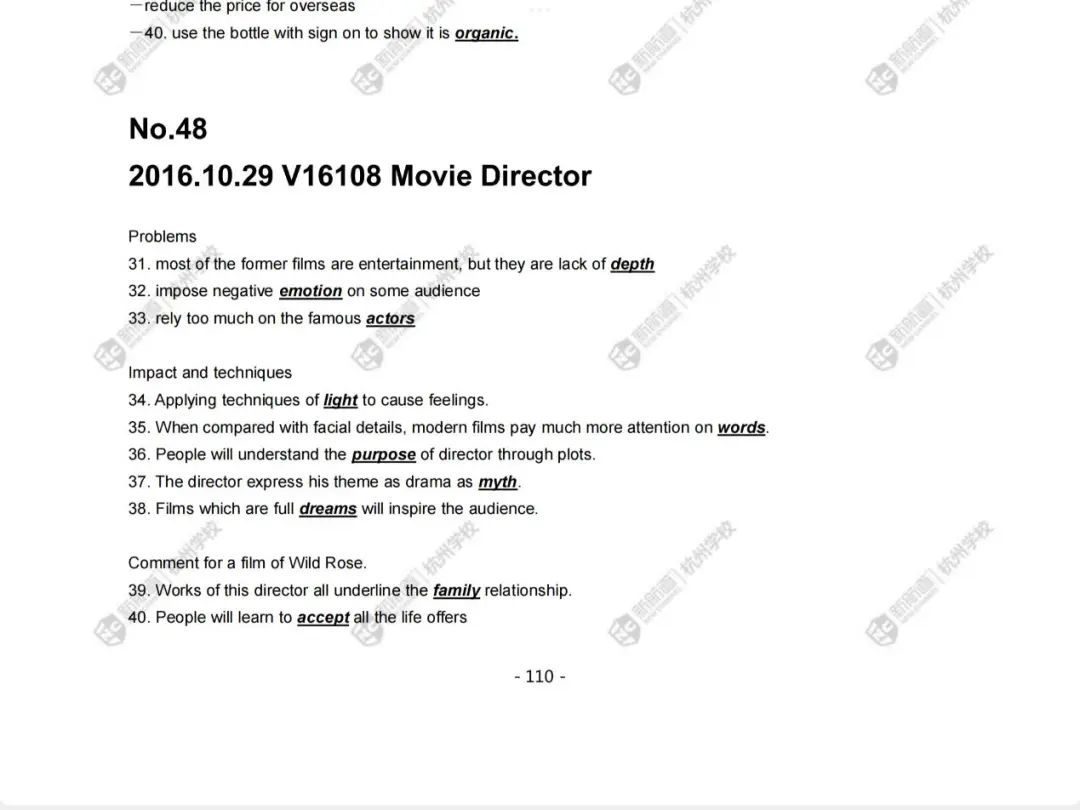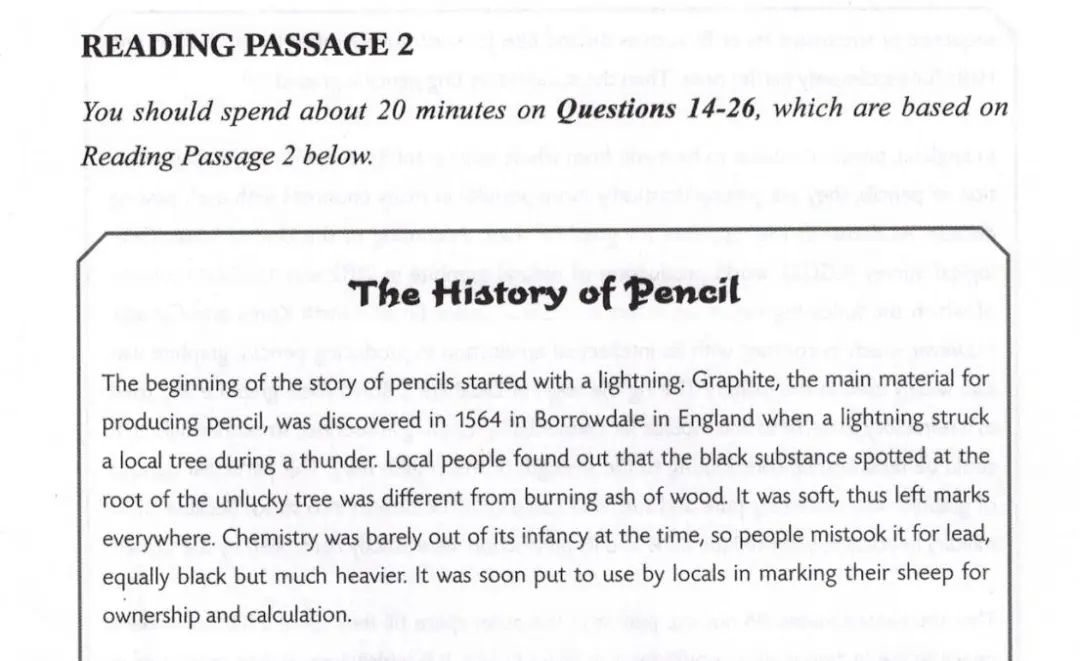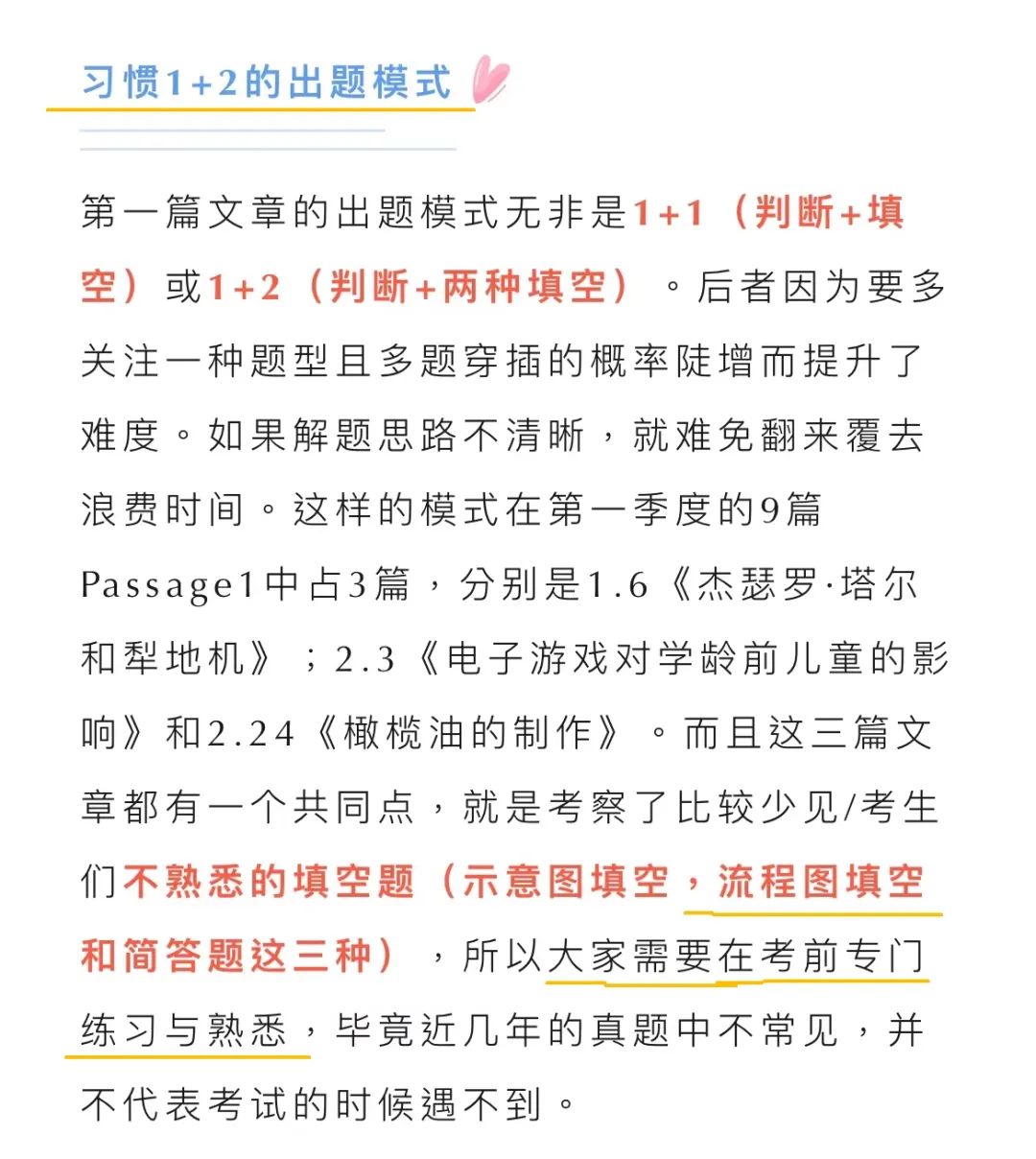4月(yuè)6日的(de)考試聽(tīng)力部分(fēn),總體難度一般。題型方面比較常規,P1P4均出現最常見的(de)筆記式填空題。 P2考察了(le)多(duō)選和(hé)匹配題,沒有出現地圖題。P3考察了(le)單選和(hé)多(duō)選題。P1P4填空題方面,答(dá)案詞難度一般,不過考生普遍反映語速較快(kuài),需要考生對(duì)答(dá)案詞的(de)拼寫非常熟悉。P2多(duō)選題選項理(lǐ)解難度一般,但要求考生具備一定的(de)同義替換思維靈活度。P3仍舊(jiù)是聽(tīng)力考試最難的(de)部分(fēn),一方面語速非常快(kuài),另一方面幹擾性較強,多(duō)次出現人(rén)物(wù)限定幹擾和(hé)選項信息不匹配幹擾。
題型:填空
1. 中介介紹學生去France做(zuò)保姆
2. 用(yòng)工家庭爸(bà)爸(bà)的(de)職業:director
3. Family name: Kellar
4. 應聘者需要會Driving
5. 開車需要大(dà)約2.5Km
6. Have a full day off on Sunday
7. Local popular sport is sailing
8. 小鎮擁有自己的(de)club
9. 居住時(shí)間:6 months
10. further detail: insurance
P1點評:第一部分(fēn)爲新題。本場(chǎng)考試個(gè)人(rén)信息填空考點占了(le)五道題,所以整體來(lái)看不算(suàn)難。首字母大(dà)寫類考點出現了(le)兩道,存在口音(yīn)的(de)考察,導緻很多(duō)選手吐槽不确定拼寫。時(shí)間和(hé)數字考點當中,幹擾信息的(de)識别也(yě)是讓很多(duō)學生頭疼的(de)部分(fēn)。另外,sailing的(de)單詞也(yě)是很多(duō)考生容易拼錯的(de)。
11-16多(duō)選
11-12. Which TWO things does the speaker say about Bruce County?
B. It has a range of landscapes
D. It is a good region for hiking
13-14. Which TWO things does the speaker say about the history of the area?
A. It was first inhabited by hunter
B. It had a successful port
15-16. Which TWO things does the speaker say about touring the town of Woods Hill?
B. There are maps at the information office
C. There are signs to guide visitors to interesting sites
17-20 匹配
17. March Festival: D. eat freshly made food
18. Lakeside Sundays: F. see a boat race
19. Salmon Spectacular: A. enter a competition
20. November Festival: C. see coloured light displays
Part 2點評:第二部分(fēn)爲舊(jiù)題,背景小鎮介紹,是P2比較常規的(de)場(chǎng)景。題型方面比較少見,沒有出現單選題,而是考察了(le)多(duō)選+匹配,總體難度一般,主要要求學生的(de)同義替換能力,不僅包括同義詞,也(yě)涉及到對(duì)思維替換的(de)考察,如a range of可(kě)以替換同近義詞a variety of,也(yě)可(kě)以具體舉例。
21-26單選
21. John and Cath's presentation plans are different in
A. the examples used
22. What do the students agree about the anatomy section of their presentation?
B. it should be kept quite short
23. What do the students agree to include in the last section?
B. demonstrations of treatment
24. What is said about the different types of heel injury?
C. some are more serious than others
25. On the subject of causes of heel injuries,the students agree to
A. focus on a single reason
26. What does Cath say about stretching as a treatment?
A. It is potentially risky
27-30 多(duō)選
27-28. Which TWO treatments did the female runner find useful?
A. massage
C. rest
29-30. Which TWO sports the male sprinter found more effective during his rehabilitation?
B. weight training
D. cycling
Part 3點評:第三部分(fēn)爲舊(jiù)題,背景爲課堂演講,屬于P3常見的(de)學術討(tǎo)論場(chǎng)景,難度較大(dà),考生普遍反應語速較快(kuài)。題型爲Part3比較常見的(de)單選和(hé)多(duō)選題,沒有出現匹配,主要考察學生的(de)排除幹擾能力,幹擾項的(de)設置包括不符合限定詞和(hé)選項細節不匹配。21-26爲單選題,出現人(rén)物(wù)限定,如21-23題幹出現different和(hé)agree。如27-30題同樣考察限定詞,考生在替換選項的(de)同時(shí),還(hái)要結合題幹的(de)useful和(hé)effective判斷正确選項。
參考《新航道雅思聽(tīng)力速遞機經p1&p4》P110
題型:填空

Part 4點評:第四部分(fēn)爲舊(jiù)題,題型方面是P4最爲常見的(de)筆記填空題,背景爲社會類,由知名導演介紹電影(yǐng)相關知識。難度從題幹内容角度來(lái)看相對(duì)簡單,就隻有myth稍難,有很多(duō)考生吐槽不認識。難點主要在于對(duì)學生的(de)預判信息能力的(de)考察,而答(dá)案詞都比較簡單。因此如果聽(tīng)前讀題環節平時(shí)有練習(xí)到位,本次p4壓力會小很多(duō)。
總覽: 第二季度的(de)第一場(chǎng)考試,考生們的(de)心可(kě)能就和(hé)倒春寒的(de)溫度一樣寒冷(lěng)。連清明(míng)假期都在複習(xí)迎考的(de)考生遇到這(zhè)樣一套卷子也(yě)著(zhe)實是不容易。不過話(huà)說回來(lái),題型配比還(hái)是常見套路沒玩花活,前兩篇如果能夠發揮穩定還(hái)是很有指望拿到滿意的(de)分(fēn)數的(de)。另外,第一季度的(de)考情總結同學們記得(de)看啊,知己知彼百戰不殆。
Passage 1 The history of pencil 鉛筆的(de)曆史

考頻(pín):14-15連考兩年之後,這(zhè)是近10年的(de)第一次選用(yòng)
類别:曆史
難度:★
題型配比:筆記填空3+T/F/NG判斷5+流程圖填空5
參考答(dá)案:
筆記填空
1. 農民用(yòng)來(lái)标明(míng)他(tā)們所擁有的(de)sheep
2. 起初被認爲是一種lead
3. 英國government意識到對(duì)生産炮彈(cannon balls)很重要
判斷
4. 博羅戴爾石墨(Borrowdale graphite)比别的(de)石墨都要好(be superior to)。T
5. 博羅戴爾地區(qū)的(de)鉛筆生産隻持續到1860s。F
6. 坎伯蘭鉛筆博物(wù)館(The Cumberland pencil museum)收藏了(le)歐洲各國的(de)鉛筆。NG
7. 對(duì)于博納克缇制筆法(Bernacottis’ method of making pencil)的(de)改進技術在今天仍被使用(yòng)。T
8. 在1662年,紐倫堡(Nuremberg)的(de)鉛筆廠使用(yòng)英國進口的(de)石墨。NG
流程圖填空
9. 石墨和(hé)粘土分(fēn)别碾磨成粉,然後cleaned并曬幹
10. ……在這(zhè)之後,筆芯被曬幹并heated
11. 筆芯被浸在(dip into)wax裏
12. 筆芯會被放到一個(gè)木(mù)闆的(de)grooves裏,上面再固定一塊木(mù)闆
13. 這(zhè)些鉛筆被varnished或上了(le)色
分(fēn)析:本周的(de)第一篇文章(zhāng)命中《9分(fēn)達人(rén)4》T6P2的(de)同類話(huà)題(也(yě)隻能算(suàn)同類話(huà)題了(le),畢竟文章(zhāng)和(hé)題型都有改動)。雖然被分(fēn)成了(le)三種題型,不過結構清晰,定位舒适,難度提升有限。另外在第一季度的(de)考情總結中可(kě)是重點和(hé)大(dà)家提過“習(xí)慣1+2”和(hé)“準備少見題型(例如流程圖)”這(zhè)兩個(gè)點,希望接下(xià)來(lái)要參加考試的(de)同學還(hái)是要把第一季度考情總結再閱讀再琢磨一下(xià)。

Passage 2 Urban Regeneration: an award-winning redevelopment project in Berlin 柏林(lín)城(chéng)市公園
考頻(pín): 2024.4.6新題
類别:建築
難度:★★
題型配比:List of Headings 6+多(duō)選2+多(duō)選2+句子填空3
參考答(dá)案:
List of Headings
14 iv 一個(gè)鐵路系統的(de)遺留(remains)
15 viii 一個(gè)地區(qū)被忽略的(de)原因(reasons)
16 i 重生計劃的(de)目标(objectives)
17 vii 穿過公園的(de)方式(ways)
18 iii 完全開發的(de)特征和(hé)設施(features and facilities)
19 v 對(duì)于完結項目的(de)積極評估(a positive evaluation)
多(duō)選(第一組)
20-21将格萊斯德賴克(Gleisdreieck)作爲公園建造地的(de)兩個(gè)原因:
B 此地有一個(gè)特殊的(de)遊客打卡點
C 位于這(zhè)個(gè)複興城(chéng)市的(de)核心
多(duō)選(第二組)
22-23下(xià)面哪兩點是柏林(lín)州(State of Berlin)想要從格萊斯德賴克(Gleisdreieck)的(de)開發中獲得(de)的(de):
A 将不同年齡層的(de)人(rén)們彙聚在一起
D 保護工業遺存
句子填空
24. 新公園的(de)中間是一個(gè)meadow……
25. 一個(gè)小火車日常營運連通(tōng)車站和(hé)一個(gè)museum
26. 很多(duō)運動和(hé)休閑設施布局在公園的(de)edges
分(fēn)析:雖然是篇新題但是不管是“Heading+多(duō)選”的(de)配比也(yě)好還(hái)是“建築”的(de)文章(zhāng)大(dà)類也(yě)好,考生們應該都已經做(zuò)麻了(le)。整體來(lái)說難度不大(dà),Heading中沒什(shén)麽生詞,意思的(de)對(duì)應指向ye很明(míng)顯。也(yě)就是最後的(de)填空題需要用(yòng)一般定位詞來(lái)進行位置确定,别的(de)小題都不太會引起很大(dà)的(de)麻煩。
Passage 3 The animal connection 人(rén)類進化(huà)與動物(wù)的(de)關系
考頻(pín):2024.4.6新題
類别:自然,曆史
難度:★★★
題型配比:Y/N/NG判斷5+摘要填空(選詞)5+單選4
參考答(dá)案:
Y/N/NG判斷
27. 比起家養動物(wù),旅行者們更容易注意到野生動物(wù)。NG
28. 所有的(de)文化(huà)都展現了(le)一種與動物(wù)緊密聯系的(de)需求。Yes
29. 動物(wù)會因爲與其他(tā)物(wù)種共享食物(wù)資源而獲益。No
30. 人(rén)類起初馴化(huà)狼不太可(kě)能是因爲将來(lái)好有個(gè)伴。Yes
31. 人(rén)類進化(huà)曆程中有幾個(gè)階段和(hé)動物(wù)的(de)關系的(de)信息不足。No
摘要填空(選詞)
32. D-adaptation
33. A-nutrition
34. B-competition
35. H-observation
36. E-territory
單選
37. 作者在第六段的(de)主要論點是什(shén)麽?
B - 早期人(rén)類重視動物(wù)行爲和(hé)外觀知識的(de)交流
38. 作者在第七段幹什(shén)麽?
D – 提出一個(gè)關于語言發展方式的(de)論斷
39. 作者提到長(cháng)尾黑(hēi)颚猴(vervet monkeys)是爲了(le)……
C – 強調人(rén)類交流的(de)複雜(zá)性
40. 作者覺得(de)“walking larder”這(zhè)個(gè)想法
A – 沒能解釋馴化(huà)的(de)目的(de)
分(fēn)析:本場(chǎng)閱讀考試所有的(de)不幸,基本上都集中在這(zhè)篇了(le)。内容晦澀,題型搭配困難,時(shí)間也(yě)不夠。基本上也(yě)就斷斷續續掃到Pat Shipman…animal connection…impacting brain size and social interactions…contributing to the development of language…the domestication process…時(shí)間也(yě)就差不多(duō)到了(le)(苦笑(xiào)

表格題+靜态圖,五個(gè)不同國家中女(nǚ)性職員(yuán)及管理(lǐ)者的(de)比例
這(zhè)個(gè)題目大(dà)家可(kě)以把數據大(dà)緻分(fēn)爲兩類來(lái)寫。Body1可(kě)以将Egypt, Sri Lanka和(hé)Japan分(fēn)在一塊,因爲這(zhè)三個(gè)國家的(de)共性都是女(nǚ)性職員(yuán)的(de)比例都遠(yuǎn)超過管理(lǐ)者的(de)比例。
Body2可(kě)以将Australia和(hé)US分(fēn)到一起,因爲這(zhè)兩個(gè)國家女(nǚ)性職員(yuán)的(de)比例和(hé)管理(lǐ)者的(de)比例相差并不大(dà)。Overview大(dà)家可(kě)以強調國與國之間女(nǚ)性職員(yuán)和(hé)管理(lǐ)者分(fēn)布比例結構不同。
Some people say that advertising has positive economic effects. Others think it has negative social effects because it will make people feel dissatisfied with who they are and what they have. Discuss both views and give your own opinion.
有些人(rén)認爲廣告能夠帶來(lái)積極的(de)經濟影(yǐng)響,然而另一些人(rén)則認爲廣告有負面的(de)社會影(yǐng)響,因爲它會使人(rén)們對(duì)自身和(hé)他(tā)們所擁有的(de)感到不滿足。討(tǎo)論雙邊的(de)觀點并給出自己的(de)個(gè)人(rén)觀點。
大(dà)作文是一道雙邊討(tǎo)論類的(de)題,這(zhè)類文章(zhāng)需要大(dà)家對(duì)于正反兩方的(de)觀點都要進行論證,并且最後還(hái)需要給出自己的(de)觀點。
討(tǎo)論正方觀點大(dà)家可(kě)以從以下(xià)的(de)方面切入:廣告可(kě)以促進消費。因爲廣告可(kě)以提高(gāo)産品的(de)知名度、突出産品的(de)優點或者刺激消費者的(de)消費欲望,從而引導消費者消費,促進産品銷量,進一步刺激經濟增長(cháng)。
反方觀點大(dà)家可(kě)以這(zhè)樣討(tǎo)論:
廣告會讓大(dà)家對(duì)自身不滿是因爲廣告裏總是會邀請各種明(míng)星偶像來(lái)爲産品站台,當消費者看到自身的(de)形象與高(gāo)顔值的(de)明(míng)星偶像相差甚遠(yuǎn)之後,就會對(duì)自己産生不滿。
而廣告會讓大(dà)家對(duì)自己所擁有的(de)感覺到不滿一方面是因爲廣告總會營造出一種好的(de)産品可(kě)以彰顯社會地位,并且提高(gāo)生活品質。所以當消費者發現自己沒有廣告裏那些華麗、昂貴的(de)産品時(shí),就會産生焦慮,對(duì)自己現有的(de)生活産生不滿。另一方面是因爲廣告喜歡誇大(dà)産品的(de)優點,讓消費者覺得(de)新産品的(de)功能和(hé)特性是他(tā)們原本擁有的(de)産品所沒有的(de),從而讓消費者對(duì)自己所擁有的(de)感到不滿足。
雖然 2024 年的(de)第一個(gè)季度剛過去,但屬于我們雅思口語的(de)第一個(gè)季度才剛迎來(lái)最後一個(gè)月(yuè)。最近讓很多(duō)爲口語焦頭爛額的(de)考生最驚喜的(de)一個(gè)消息就是口語可(kě)以單項考試了(le),當然考試的(de)各種條件限制以及學校是否接受還(hái)需要大(dà)家自己去确認下(xià)。目前還(hái)是要踏踏實實好好準備我們的(de)考試。今天也(yě)是我們中國傳統節日清明(míng)節的(de)假期最後一天,順便提一下(xià)清明(míng)節的(de)英文和(hé)相關話(huà)題詞彙:
Qingming Festival / Tomb-Sweeping Day
In memory/remembrance of 以紀念,以緬懷
sweep the tomb 掃墓
burn joss paper 燒紙錢
visit the cemetery 去墓園
pay respect to people who passed away 追思故人(rén)
green rice ball 青團
drizzle v. 下(xià)毛毛雨(yǔ)
然後下(xià)面是考情及預測:
本篇主要收錄2024年1-4月(yuè)的(de)雅思紙筆口語和(hé)機考口語題目。
請大(dà)家結合題庫,本份考情分(fēn)析進行構思、準備、演練。
*值得(de)一提的(de)是,因爲4月(yuè)已是季度後期,所以理(lǐ)論上不存在什(shén)麽“新題”或者“舊(jiù)題”。雖然每個(gè)季度來(lái)看的(de)确新題更爲高(gāo)頻(pín),但放到每個(gè)人(rén)身上一切皆有可(kě)能。仍舊(jiù)建議(yì)有時(shí)間的(de)同學一定全部好好準備一遍,準備的(de)過程不是隻是寫下(xià)來(lái),而是要自己說出來(lái)并且進行必要的(de)重複練習(xí)。
*時(shí)間緊張的(de)同學,重點優先準備題庫中的(de)新增題庫,其次是保留題庫。一邊刷題庫,一邊整理(lǐ)語料,根據預測來(lái)高(gāo)效準備,盡量考前确保所有預測都按順序至少刷過一遍。
必考題:Work or study / Hometown / Accommodation / The area you live in
Part 1
新增題庫
Memory/advertisement/video games/feeling bored/crowded place/collecting things/cakes/colors/social media/sunglasses/celebrity news/money/singing
保留題庫
Traveling/clothing/transport/musical instruments/chatting/map/noise/running/films/tea and coffee/geography/fishing/helping others/gifts/robots
Part 2
新增題庫
Describe a person who is good at making people feel welcomed in his/her home
Describe a time when someone who did quite well in a team
Describe a person you know who likes to talk a lot
Describe an old person who you had an interesting conversation with
Describe a place you would like to go to relax(可(kě)能改成Describe a place you often go to relax)
Describe a time when you helped someone
Describe an occasion when there was a lot of noise
Describe an unusual holiday/vacation you had
Describe an occasion when you used a map
Describe a travel you were looking forward to but was delayed
Describe a time you were very busy
Describe a time you bought something from a street (or outdoor) market
Describe a time you had to finish something quickly
Describe an occasion when you heard someone complaining about something in a restaurant/store or other business places
Describe a time when you picked up an item that someone else lost(可(kě)能改成Describe a time when you lost an item)
Describe a public facility (e.g. a museum, a library) that has been renovated and improved
Describe a job that you would not like to do in the future
Describe a useful object in your home that you cannot live without
Describe a useful skill that you learned as a teenager
Describe an outdoor activity you did
Describe a uniform you wear (e.g. at school, at work)
Describe something you do to help you study or work
保留題庫
Describe an interesting person that you that you haven’t met in person but would like to know more about
Describe a person who always has interesting ideas or opinions
Describe a successful businessperson you know (e.g running a family business)
Describe a sportsperson you admire
Describe a person who likes to cook for others
Describe a foreign person who speaks Chinese well
Describe a park or a garden in your city
Describe a place in your country that you are interested in
Describe a beautiful city
Describe a party that you enjoyed
Describe an activity that made you feel tired
Describe a bad service you received in a restaurant/shop
Describe an occasion when you waited a long time for a nice thing
Describe a time when you had a problem with using a computer
Describe a difficult task that you completed at work/ study that you felt proud of
Describe a period of time that changed your life
Describe a painting you have seen
Describe a photo that makes you feel happy
Describe a science, subject (Biology, Robotics, etc) that you are interested in
Describe a rule that is important in your school or at work
Describe a good advertisement that you think is useful
Describe a piece of good advise that you gave to someone
備考建議(yì):
下(xià)面講解一下(xià)目前本季度最高(gāo)頻(pín)的(de)一道P2 題目怎麽說,事件類 11 題:使用(yòng)地圖的(de)經曆
Describe an occasion when you used a map (e.g. a paper map, an electronic map) that was useful
You should say:
When and where you used the map
What it was like
How useful it was
Why you used it
And explain how you felt about the experience
很多(duō)同學可(kě)能看到這(zhè)道題沒有什(shén)麽思路,想不到什(shén)麽使用(yòng)地圖的(de)經曆。但其實我們平常去一些旅遊景點,比如公園,遊樂(yuè)園,動物(wù)園都會用(yòng)到地圖。有了(le)素材之後,整道題我們可(kě)以按照(zhào)事件類話(huà)題的(de)基本結構來(lái)進行構建when / where / who / what / how you felt about it,然後when / where / who這(zhè)三個(gè)基本要素進行相應的(de)拓展。按照(zhào)題目的(de)要求,What it was like描述地圖的(de)樣子會是一個(gè)難點。另外,整個(gè)使用(yòng)地圖的(de)經曆,做(zuò)了(le)什(shén)麽事情也(yě)是比較麻煩的(de)内容,會涉及到遊樂(yuè)園裏面相關的(de)話(huà)題詞彙和(hé)表達。
關于What it was like,給大(dà)家一個(gè)參考,這(zhè)邊是講去迪士尼樂(yuè)園用(yòng)的(de)官方的(de)app裏面的(de)地圖,因爲是電子的(de)軟件,可(kě)能會涉及到相關的(de)話(huà)題詞彙,比如一些功能的(de)表達,按鈕怎麽說,以及外形的(de)描述。
Before we went to the park, I whipped out拿出 my phone, downloaded the Disneyland app, and checked out the map section. All I had to do was to press the button in the middle and the map was awesome:It showed me all the attractions including those rides遊樂(yuè)設施, restaurants and toilets in the park. I could zoom in and out放大(dà)縮小, filter attractions篩選景點, and see real-time實時(shí)的(de) wait time for the rides. It was like having the whole park right in my pocket.
而在經曆描述部分(fēn),其實可(kě)以按照(zhào)大(dà)家逛樂(yuè)園做(zuò)的(de)事情進行分(fēn)類,比如找好玩的(de)遊樂(yuè)設施,找餐廳等作爲幾個(gè)關鍵事件點,然後分(fēn)别進行拓展:
Then I used the map to help me plan my day. I checked where all the fun stuff was, like the rides, food spots, and restrooms. And I first went to those attractions that I didn’t need to wait for a long time for. At noon, I also looked for a nearest restaurant on it so that I didn’t have to walk too long.
最後給到大(dà)家一些遊樂(yuè)園或者動物(wù)園相關的(de)話(huà)題詞彙:
Sure, here are the vocabulary related to amusement parks and zoos provided in both Chinese and English:
遊樂(yuè)園相關詞彙 (Amusement Park Vocabulary):
1. 過山車 - Roller coaster
2. 摩天輪 - Ferris wheel
3. 旋轉木(mù)馬 - Carousel
4. 碰碰車 - Bumper cars
5. 水(shuǐ)滑梯 - Water slide
6. 鬼屋 - Haunted house
7. 旋轉木(mù)馬 - Merry-go-round
8. 驚險遊樂(yuè)設施 - Thrill rides
9. 遊戲廳 - Arcade games
10. 美(měi)食廣場(chǎng) - Food court
11. 紀念品店(diàn) - Souvenir shop
12. 遊行 - Parade
13. 煙(yān)花 - Fireworks
14. 入場(chǎng)券 - Admission ticket
15. 公園地圖 - Park map
動物(wù)園相關詞彙 (Zoo Vocabulary):
1. 動物(wù) - Animals
2. 動物(wù)展覽 - Exhibits
3. 圍場(chǎng) - Enclosures
4. 野生動物(wù) - Wildlife
5. 保護 - Conservation
6. 動物(wù)管理(lǐ)員(yuán) - Zookeeper
7. 動物(wù)飼料 - Animal feed
8. 動物(wù)行爲 - Animal behavior
9. 野生動物(wù)園 - Safari
10. 水(shuǐ)族館 - Aquarium
11. 爬行動物(wù)館 - Reptile house